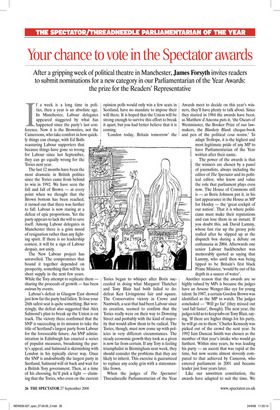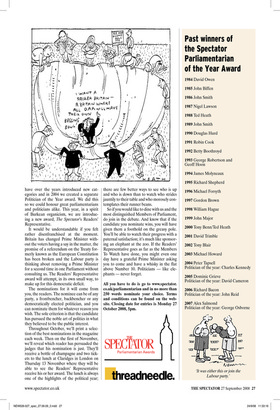Your chance to vote in the Spectator awards
After a gripping week of political theatre in Manchester, James Forsyth invites readers to submit nominations for a new category in our Parliamentarian of the Year Awards: the prize for the Readers’ Representative If a week is a long time in politics, then a year is an absolute age. In Manchester, Labour delegates appeared staggered by what has happened since the party’s last conference. Now it is the Brownites, not the Cameroons, who take comfort in how quickly things can change, with Ed Balls reassuring Labour supporters that because things have gone so wrong for Labour since last September, they can go equally wrong for the Tories next year.
The last 12 months have been the most dramatic in British politics since the Tories came from behind to win in 1992. We have seen the fall and fall of Brown — at every point when we thought that the Brown bottom has been reached, it turned out that there was further to fall. Labour is now staring at a defeat of epic proportions. Yet the party appears to lack the will to save itself. Among Labour delegates in Manchester there is a grim mood of resignation rather than any fighting spirit. If there is no leadership contest, it will be a sign of Labour despair, not unity.
The New Labour project has unravelled. The compromises that bound it together depended on prosperity, something that will be in short supply in the next few years. While the Tory attempt to replicate them — sharing the proceeds of growth — has been outrun by events.
Labour’s defeat in Glasgow East showed just how far the party had fallen. To lose your 26th safest seat is quite something. But worryingly, the defeat also suggested that Alex Salmond’s plan to break up the Union is on track. The victory there confirmed that the SNP is succeeding in its mission to take the title of Scotland’s largest party from Labour for the foreseeable future. An SNP administration in Edinburgh has enacted a series of populist measures, broadening the party’s appeal, and Salmond is skirmishing with London in his typically clever way. Once the SNP is undoubtedly the largest party in Scotland, Salmond will sit back and wait for a British Tory government. Then, at a time of his choosing, he’ll pick a fight — claiming that the Tories, who even on the current opinion polls would only win a few seats in Scotland, have no mandate to impose their will there. It is hoped that the Union will be strong enough to survive this effort to break it apart, but you had better believe that it is coming.
‘London today, Britain tomorrow’ the Tories began to whisper after Boris succeeded in doing what Margaret Thatcher and Tony Blair had both failed to do: defeat Ken Livingstone fair and square. The Conservative victory in Crewe and Nantwich, a seat that had been Labour since its creation, seemed to confirm that the Tories really were on their way to Downing Street and probably with the kind of majority that would allow them to be radical. The Tories, though, must now come up with policies in very different circumstances. The steady economic growth they took as a given is now far from certain. If any Tory is feeling triumphalist in Birmingham next week, they should consider the problems that they are likely to inherit. This exercise is guaranteed to replace any cocky grin with a statesmanlike frown.
When the judges of The Spectator/ Threadneedle Parliamentarian of the Year Awards meet to decide on this year’s winners, they’ll have plenty to talk about. Since they started in 1984 the awards have been, as Matthew d’Ancona puts it, ‘the Oscars of Westminster, the Booker Prize of our lawmakers, the Blankety Blank cheque-book and pen of the political cosa nostra.’ To adapt Trollope, it is the highest and most legitimate pride of any MP to have Parliamentarian of the Year written after their name.
The power of the awards is that the winners are chosen by a panel of journalists, always including the editor of The Spectator and its political editor, who know and value the role that parliament plays even now. The House of Commons still is — as Boris Johnson put it, in his last appearance in the House as MP for Henley — the ‘great cockpit of our nation’. That it is where politicians must make their reputations and can lose them in an instant. If you doubt this, ask David Lammy, whose fast rise up the greasy pole stalled after he slipped up at the dispatch box during a debate on euthanasia in 2004. Afterwards one senior Labour backbencher was memorably quoted as saying that Lammy, who until then was being tipped to be Britain’s first black Prime Minister, ‘would be out of his depth in a saucer of water’.
Another reason that the awards are so highly valued by MPs is because the judges have an Arsene Wenger-like eye for young talent. In 1987, a certain Gordon Brown was identified as the MP to watch. The judges concluded — ‘Will go far’ (they missed out ‘and fall faster’, though). The next year, the judges told us to keep tabs on Tony Blair, saying, ‘If there are higher things for his party, he will go on to them.’ Charles Kennedy was picked out of the crowd the next year. In 1992 Iain Duncan Smith was chosen as the member of that year’s intake who would go furthest. Within nine years, he was leading his party — an ascent that was rapid at the time, but now seems almost slovenly compared to that achieved by Cameron, who entered parliament in 2001 and became leader just four years later.
Like our unwritten constitution, the awards have adapted to suit the time. We have over the years introduced new categories and in 2004 we created a separate Politician of the Year award. We did this so we could honour great parliamentarians and politicians alike. This year, in a spirit of Burkean organicism, we are introducing a new award, The Spectator’s Readers’ Representative.
It would be understandable if you felt rather disenfranchised at the moment. Britain has changed Prime Minister without the voters having a say in the matter, the promise of a referendum on the Treaty formerly known as the European Constitution has been broken and the Labour party is thinking about removing a Prime Minister for a second time in one Parliament without consulting us. The Readers’ Representative award will attempt, in its own small way, to make up for this democratic deficit.
The nominations for it will come from you, the readers. The nominee can be of any party, a frontbencher, backbencher or any democratically elected politician, and you can nominate them for whatever reason you wish. The sole criterion is that the candidate has pursued the noble art of politics in what they believed to be the public interest.
Throughout October, we’ll print a selection of the best nominations in the magazine each week. Then on the first of November, we’ll reveal which reader has persuaded the judges that his nomination is just. They’ll receive a bottle of champagne and two tickets to the lunch at Claridges in London on Thursday 13 November where they will be able to see the Readers’ Representative receive his or her award. The lunch is always one of the highlights of the political year; there are few better ways to see who is up and who is down than to watch who strides jauntily to their table and who morosely contemplates their runner beans.
So if you would like to dine with us and the most distinguished Members of Parliament, do join in the debate. And know that if the candidate you nominate wins, you will have given them a foothold on the greasy pole. You’ll be able to watch their progress with a paternal satisfaction; it’s much like sponsoring an elephant at the zoo. If the Readers’ Representative goes as far as the Members To Watch have done, you might even one day have a grateful Prime Minister asking you to come and have a whisky in the flat above Number 10. Politicians — like elephants — never forget.











































































 Previous page
Previous page